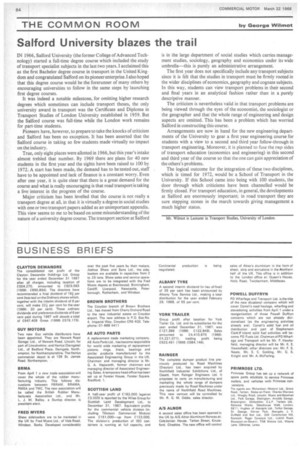THE COMMON ROOM by George Wilmot
Page 66

If you've noticed an error in this article please click here to report it so we can fix it.
Salford University blazes the trail
IN 1966, Salford University (the former College of Advanced Technology) started a full-time degree course which included the study of transport specialist subjects in the last two years. I acclaimed this as the first Bachelor degree course in transport in the United Kingdom and congratulated Salford on its pioneer enterprise. I also hoped that this degree course would be the forerunner of many others by encouraging universities to follow in the same steps by launching first degree courses.
It was indeed a notable milestone, for omitting higher research degrees which sometimes can include transport theses, the only university award in transport was the Certificate and Diploma in Transport Studies of London University established in 1959. But the Salford course was full-time while the London work remains for part-time students.
Pioneers have, however, to prepare to take the knocks of criticism and Salford has been no exception. It has been asserted that the Salford course in taking so few students made virtually no impact on the industry.
True, only eight places were allotted in 1966, but this year's intake almost trebled that number. By 1969 there are plans for 40 new students in the first year and the sights have been raised to WO by 1972. A start has been made, the demand has to be tested out, staff have to be appointed and lack of finance is a constant worry. Even after one year, it is quite clear that there is a great demand for the course and what is really encouraging is that road transport is taking a live interest in the progress of the course.
Major criticism has been levelled that the course is not really a transport degree at all, in that it is virtually a degree in social studies with one or two transport papers added as an unimportant appendix. This view seems to me to be based on some misunderstanding of the nature of a university degree course. The transport section at Salford is in the large department of social studies which carries management studies, sociology, geography and economics under its wide umbrella—this is purely an administrative arrangement.
The first year does not specifically include any transport subjects since it is felt that the studies in transport must be firmly rooted in the wider disciplines of economics, geography and cognate subjects. In this way, students can view transport problems in their second and final years in an analytical fashion rather than in a purely descriptive manner.
The criticism is nevertheless valid in that transport problems are being viewed through the eyes of the economist, the sociologist or the geographer and that the whole range of engineering and design aspects are omitted. This has been a problem which has worried Salford in constructing this course.
Arrangements are now in hand for the new engineering departments of the University to gear a first year engineering course for students with a view to a second and third year follow-through in transport engineering. Moreover, it is planned to fuse the to sides of transport education (economics and engineering) in this second and third year of the course so that the one can gain appreciation of the others's problems.
The logical outcome for the integration of these two disciplines, which is timed for 1972, would be a School of Transport in the University. If this School came into being with 100 students, the door through which criticisms have been channelled would be firmly closed. For transport education, in general, the developments at Salford are enormously important; in road transport they are sure stepping stones in the march towards giving management a much higher status.












































































































